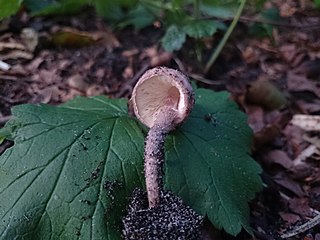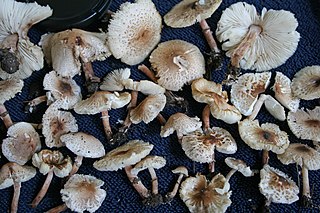
Citrus hystrix, called the kaffir lime or makrut lime, is a citrus fruit native to tropical Southeast Asia.

Lepiota is a genus of gilled mushrooms in the family Agaricaceae. All Lepiota species are ground-dwelling saprotrophs with a preference for rich, calcareous soils. Basidiocarps are agaricoid with whitish spores, typically with scaly caps and a ring on the stipe. Around 400 species of Lepiota are currently recognized worldwide. Many species are poisonous, some lethally so.

Echinoderma is a genus of fungi in the family Agaricaceae. Its members were for a long time considered to belong to genus Lepiota and the group was then circumscribed by French mycologist Marcel Bon in 1981 as a subgenus of Cystolepiota before he raised it to generic status in 1991.

The Indian crested porcupine is a hystricomorph rodent species native to southern Asia and the Middle East. It is listed as Least Concern on the IUCN Red List. It belongs to the Old World porcupine family, Hystricidae.

The spot-fin porcupinefish, also known as the spotted porcupinefish, black-spotted porcupinefish or simply porcupinefish, is a member of the family Diodontidae.

Echinoderma asperum or Lepiota aspera, sometimes known commonly as the freckled dapperling, is a large, brownish, white-gilled mushroom, with a warty or scaly cap. It lives in woodland, or on bark chips in parks, and gardens.

Leucocoprinus fragilissimus, commonly known as the fragile dapperling, is a species of gilled mushroom in the family Agaricaceae.

Lepiota cristata, commonly known as the stinking dapperling, brown-eyed parasol, or the stinking parasol, is an agaric and possibly poisonous mushroom in the family Agaricaceae. A common and widespread species—one of the most widespread fungi in the genus Lepiota—it has been reported from Europe, northern Asia, North America, and New Zealand. It fruits on the ground in disturbed areas, such as lawns, path and road edges, parks, and gardens. The species produces fruit bodies characterized by the flat, reddish-brown concentric scales on the caps, and an unpleasant odour resembling burnt rubber. Similar Lepiota species can sometimes be distinguished from L. cristata by differences in cap colour, stipe structure, or odour, although some species can only be reliably distinguished through the use of microscopy.
Leucopholiota lignicola is a species of fungus belonging to the family Agaricaceae.

Lepiota cortinarius is a species of fungus belonging to the family Agaricaceae.

Lepiota fuscovinacea is a species of fungus belonging to the family Agaricaceae.
Lepiota kuehneri is a species of fungus belonging to the family Agaricaceae.

Lepiota lilacea is a species of fungus belonging to the family Agaricaceae. It was first described in Italy, in 1893, by Giacomo Bresadora, in his book Fungi Tridentini.

Lepiota subalba is a species of fungus belonging to the family Agaricaceae.
Paraliparis hystrix is a species of fish in the family Liparidae (snailfish).

The Socotran pipistrelle or Lanza's pipistrelle is an endangered species of vesper bat in the family Vespertilionidae. It is endemic to Socotra Island in Yemen, and is the only mammal thought to be endemic to the island.
Leucocoprinus beelianus is a species of mushroom producing fungus in the family Agaricaceae.

Macrolepiota zeyheri is a species of mushroom producing fungus in the family Agaricaceae. In the Kilendu dialect it is known as djilo and in the Kilur dialect it is called n'volo mighom.














